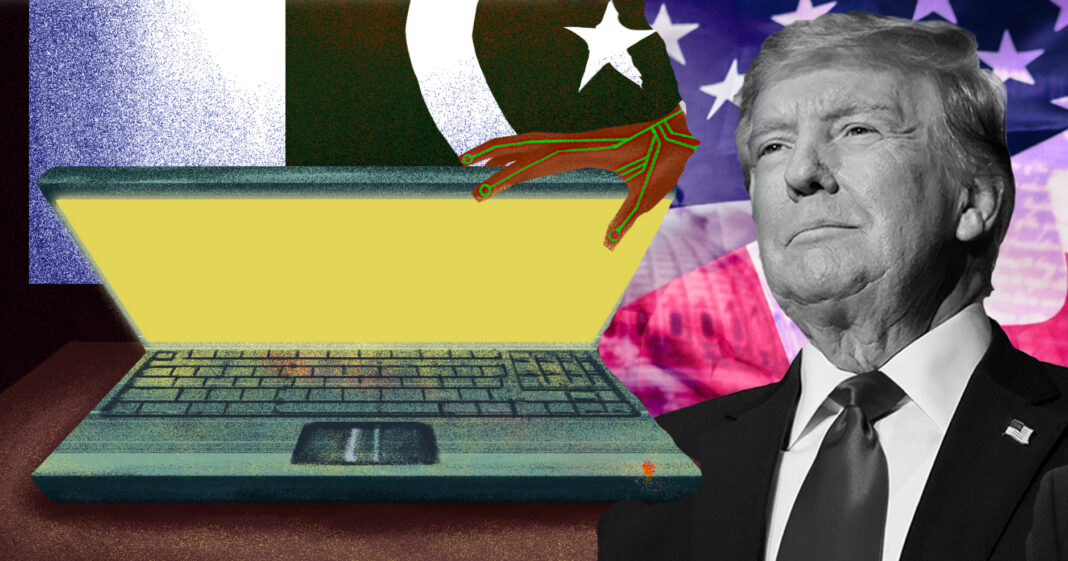In the labyrinthine digital freedom, Pakistan finds itself trapped in a grotesque dance of digital censorship and electoral drama, where hypocrisy reigns supreme and national interests dissolve into a pathetic spectacle of political maneuvering. The recent US elections have exposed the raw, unvarnished vulnerability of Pakistan’s political landscape, revealing a system so fragile that it trembles at the mere whisper of digital communication. The ban on X (formerly Twitter) epitomizes the country’s desperate attempt to control narrative and suppress dissent, a move that speaks volumes about the regime’s profound insecurity.
Prime Minister Shehbaz Sharif’s recent escapade perfectly encapsulates the absurdity of this situation. Caught red-handed using a VPN to congratulate Donald Trump on a platform his own government had banned, Sharif demonstrated the most brazen form of institutional hypocrisy. The irony is rich that a national leader circumventing laws he himself had implemented, all to send a sycophantic message to a foreign leader whose economic policies could potentially devastate Pakistan’s already fragile economy. The justification for the X ban reveals the government’s paranoid mindset. Claiming national security concerns and alleging that militants from the Balochistan Liberation Army were using the platform for “anti-national activities” represents nothing more than a thinly veiled attempt to control information flow. It’s a classic authoritarian playbook to restrict communication channels to maintain a carefully curated narrative.
What makes this digital censorship particularly egregious is its selective implementation. While the government claims to protect national interests, it simultaneously demonstrates a complete disregard for the very principles of free speech and transparency it purports to defend. The ban disproportionately affects opposition voices, with Imran Khan’s party being a prime target, effectively transforming digital platforms into political battlegrounds. The US elections have further complicated this already. The potential return of Donald Trump brings with it a tsunami of economic uncertainties that could decimate Pakistan’s already struggling economy. Economists warn of potential inflationary pressures, increased production costs, and a strengthening US dollar – all of which spell disaster for an import-dependent nation.
Consider the economic realities: Pakistan imports nearly 85% of its energy requirements and runs a trade deficit of approximately $25 billion. Trump’s proposed tariffs and aggressive economic policies could push global inflation to unprecedented levels, rendering Pakistan’s economic recovery not just challenging, but potentially impossible. The country’s external debt, already a Damocles sword hanging precariously, would become even more unmanageable. The Federal Reserve’s upcoming decisions hold more significance for Pakistan than any electoral outcome. With potential interest rate hikes, the US dollar’s appreciation would trigger a catastrophic chain reaction – depreciating the Pakistani rupee, escalating food inflation, and eroding any semblance of economic stability.
Meanwhile, the digital ban on X represents a microcosm of Pakistan’s broader approach to international communication and domestic discourse. By blocking platforms, the government reveals its fundamental mistrust of its citizens and its fear of uncontrolled narratives. The move is less about national security and more about maintaining a suffocating grip on information dissemination. The social media reaction to Sharif’s VPN-enabled congratulatory message was telling. Users didn’t just mock the action; they exposed the systemic corruption and puppet-like behavior of political leadership.
This digital censorship is not an isolated incident but part of a broader trend. Pakistan has previously imposed restrictions on platforms like YouTube and TikTok, consistently demanding compliance with local censorship laws. The message is clear: control the narrative at all costs, even if it means sacrificing fundamental digital freedoms. The intersection of the US elections, digital censorship, and Pakistan’s economic vulnerability creates a perfect storm of political dysfunction. It reveals a system so broken that its leaders must resort to VPNs to communicate internationally while simultaneously blocking their own citizens from similar platforms.
As the world moves towards more open, transparent forms of communication, Pakistan seems determined to swim against the tide, clinging to outdated, repressive models of information control. The X ban is not just a technological restriction; it’s a symbolic representation of a political establishment more concerned with maintaining power than serving its people. In this bizarre geopolitical theater, Pakistan stands as a testament to the dangers of unchecked political power, digital authoritarianism, and economic mismanagement. The US elections might bring global economic shifts, but Pakistan’s real challenge lies in addressing its internal systemic failures.
The road to recovery is not through censorship or hopeful expectations from foreign leaders, but through genuine economic reforms, transparent governance, and a commitment to digital freedom. Until then, Pakistan remains trapped in a cycle of political drama, economic uncertainty, and digital repression – a cautionary tale of how not to manage a nation in the digital age. The global community watches with a mixture of horror and fascination as Pakistan continues its self-destructive moves, sacrificing its economic potential and democratic principles at the altar of political expediency. The X ban is more than just a social media restriction; it’s a painful reflection of a nation losing its way, one censored platform at a time.

